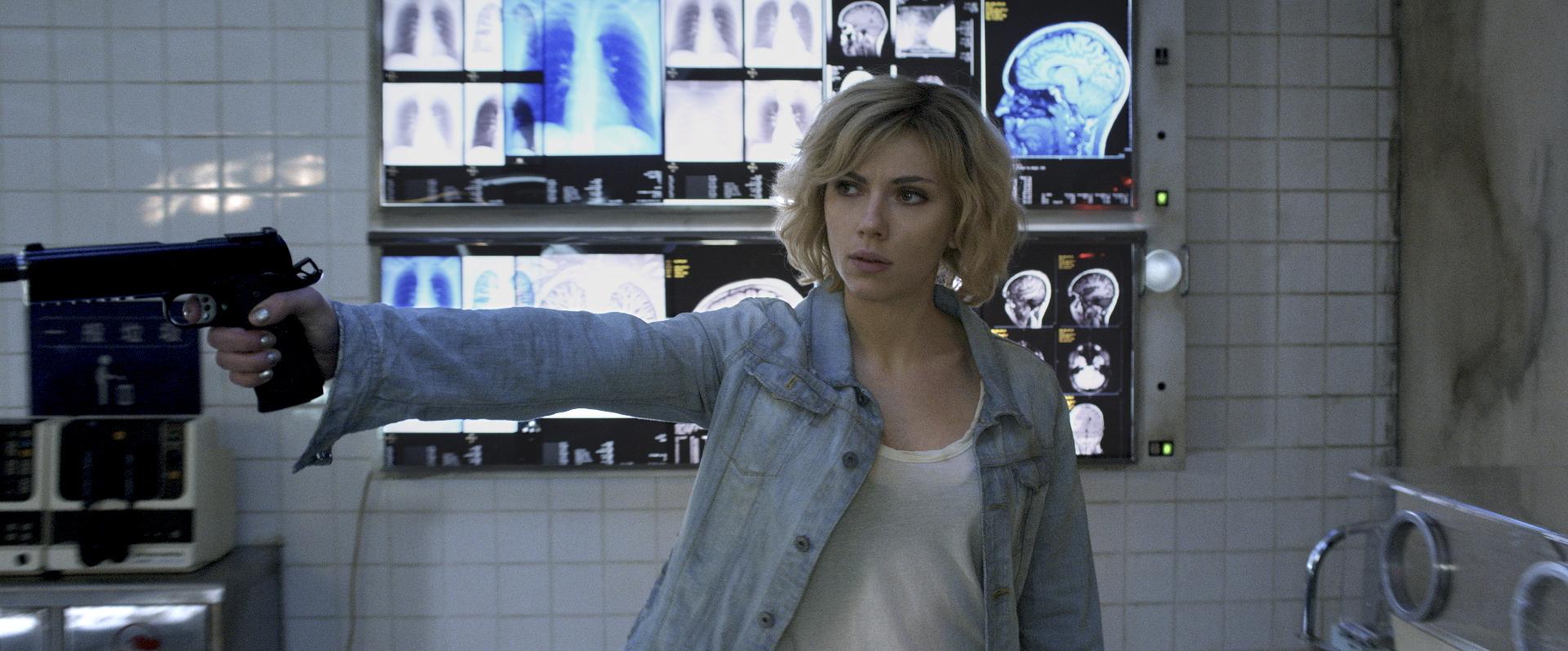 ★★★
★★★
“NOW there is a god…”
Besson has been making action heroine movies for almost a quarter-century, going back to Nikita, which remains one of the most iconic and influential genre entries. The Messenger and Angel-A are the most obvious members of his filmography, but even when they’re not strictly in our wheelhouse, they often contain those aspects, e.g. The Fifth Element or Leon. The prospect of him returning to the field was an exciting one, but the end result doesn’t quite live up to what I’d hoped. And that’s discounting the fact, trotted out by a lot of lazy critics, that the entire film is based on a shaky premise – the whole “we only use ten percent of our brains” things is pure myth. I have no real issues with that. There’s no evidence for the galaxy having guardians either, and the same premise was an integral part of Defending Your Life, currently 96% fresh at Rotten Tomatoes.
 No, my main issue is a failure to unleash the potential of the idea (rather than the human brain). The initial set-up is interesting and slick. Lucy (Johansson) is trapped into acting as a drug mule for a Korean mob-boss (Choi), but the package inserted into her stomach is breached, causing the contents to leak into her bloodstream, and triggering the gradual activation of the remaining 90% of her brain. Initially, she becomes self-aware, but her skills then increase exponentially, first to manipulating her environment, then the very fabric of time and space itself, before she vanishes entirely from our world. Freeman plays Professor
No, my main issue is a failure to unleash the potential of the idea (rather than the human brain). The initial set-up is interesting and slick. Lucy (Johansson) is trapped into acting as a drug mule for a Korean mob-boss (Choi), but the package inserted into her stomach is breached, causing the contents to leak into her bloodstream, and triggering the gradual activation of the remaining 90% of her brain. Initially, she becomes self-aware, but her skills then increase exponentially, first to manipulating her environment, then the very fabric of time and space itself, before she vanishes entirely from our world. Freeman plays Professor Exposition Samuel Norman, whom Lucy contacts to… Well, I’m not really sure exactly why. Something about him being the guardian of the knowledge she acquires as her mind expands. Waked plays a French cop, who helps her get the entire global supply of the drug, needed for her to reach 100%. We get a literal score of her progression in this department, tabulated on screen between scenes.
I think this would have benefited from a more measured approach, rather than a headlong rush toward Lucy’s divinity: the journey is more fun than the destination. There’s a certain point here, perhaps half-way through, where she becomes entirely invincible, and that’s where this turns into an intellectual exercise, because no-one – least of all a bunch of Korean gangsters – is a credible threat any more. I would have had Lucy get a little taste of the drug, then spend most of the film exploring what life is like as a super-enhanced bad-ass, using her talents to acquire more of the drug. Perhaps have the film end as she cranks the proceeds into her veins, and only then quickly go all 2001 on the audience, as Besson does at much greater length here. That’s closer to what I was expecting, and may be the result of publicity that seemed to set this up as an action flick with existentialist aspirations, when it’s really an existentialist flick with action aspirations.
 While I’d have enjoyed the former more, there are no shortage of aspects to admire. Besson’s films are generally a lot of fun, and this delivers the level of visual style and polish we’ve come to expect from all his works, both directed and produced – the car-chase is particularly Bessonesque. Johansson is also good in the role, though Freeman seems faintly embarrassed to be there, as if he should instead be off narrating another Science Channel documentary. Credit is due too, for making an action movie which is not only R-rated, but with a heroine, a combination which has been a difficult sell in the past e.g. Haywire. Lucy has arguably become the first such to pass $100 million at the US box-office, depending on how you view T2, and I’m more than happy to see it succeed, even if any sequel resulting from its profitability is going to be answering some difficult questions!
While I’d have enjoyed the former more, there are no shortage of aspects to admire. Besson’s films are generally a lot of fun, and this delivers the level of visual style and polish we’ve come to expect from all his works, both directed and produced – the car-chase is particularly Bessonesque. Johansson is also good in the role, though Freeman seems faintly embarrassed to be there, as if he should instead be off narrating another Science Channel documentary. Credit is due too, for making an action movie which is not only R-rated, but with a heroine, a combination which has been a difficult sell in the past e.g. Haywire. Lucy has arguably become the first such to pass $100 million at the US box-office, depending on how you view T2, and I’m more than happy to see it succeed, even if any sequel resulting from its profitability is going to be answering some difficult questions!
Watching this, I was left with a frequent urge to yell the line at the top of the review, which is taken from a famous SF short-short story by Frederic Brown, about the perils of unfettered technology and artificially constructed deities. Lucy is the human equivalent, though according to Besson, “A simplified summary, which will conjure up the images in as few words as possible,” was that “The beginning is Leon: The Professional. The middle is Inception. The end is 2001: A Space Odyssey.” This overview probably explains why my entertainment level diminished as things went on, because I love Leon and regard 2001 as one of the most over-rated pieces of tripe in cinema history, containing spectacular visuals, but little or no heart. That’s what Lucy is sadly missing: you can see Johansson deliberately dialing back her humanity, the higher her percentage of brain function becomes. It makes sense, but you’re left with little reason to empathize with her; it’s like nothing so much as watching Superman being super, and there is no kryptonite in sight here to bring her back to the level of the audience.
Re-reading the above, it seems perhaps unnecessarily harsh. Make no mistake, this was a fun ride, and I was never bored. It may be a case of managing expectations here: if you’re happy with a film which builds to having the heroine sit on a chair for 20 minutes, before going all Neo on us for a finale, then this will be fine. But given Besson’s pedigree, combined with a trailer which made this seem more like the Black Widow film we’ve been promised than anything, I was anticipating something rather different. It’s not often I criticize a film for being too much brains and not enough brawn, yet this might be one such case.
Dir: Luc Besson
Star: Scarlett Johansson, Morgan Freeman, Amr Waked, Choi Min-sik





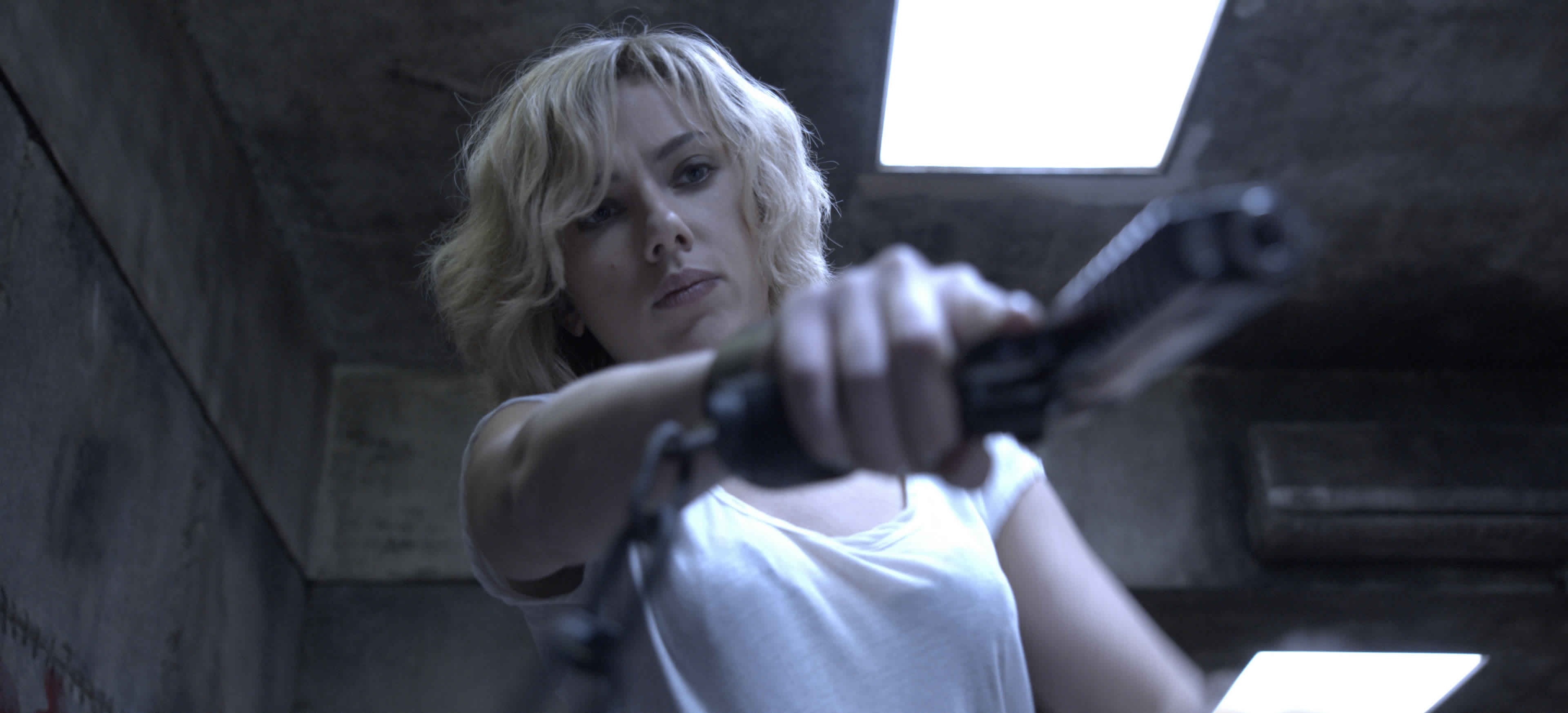
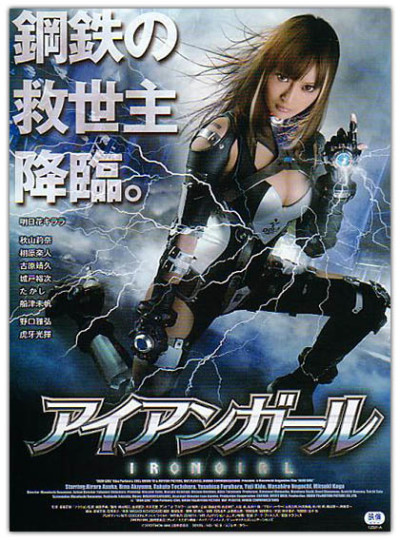 The introduction tries to make it seem as if this could take place at any point in history, but there’s not much effort put into maintaining the illusion. The guns and overall setting – best described as “distressed warehouse” – puts this firmly into the post-apocalypse genre, though it’s very much at the bargain basement end of the spectrum. The heroine (adult actress Asuka) stumbles across naively innocent Anne (Akiyama), being pawed by some bad guys after straying into the danger zone to pick flowers; clearly a kinder, gentler apocalypse. After punching them out, assisted by remarkable reactions and her metal exo-skeleton, Anne is escorted back to her
The introduction tries to make it seem as if this could take place at any point in history, but there’s not much effort put into maintaining the illusion. The guns and overall setting – best described as “distressed warehouse” – puts this firmly into the post-apocalypse genre, though it’s very much at the bargain basement end of the spectrum. The heroine (adult actress Asuka) stumbles across naively innocent Anne (Akiyama), being pawed by some bad guys after straying into the danger zone to pick flowers; clearly a kinder, gentler apocalypse. After punching them out, assisted by remarkable reactions and her metal exo-skeleton, Anne is escorted back to her 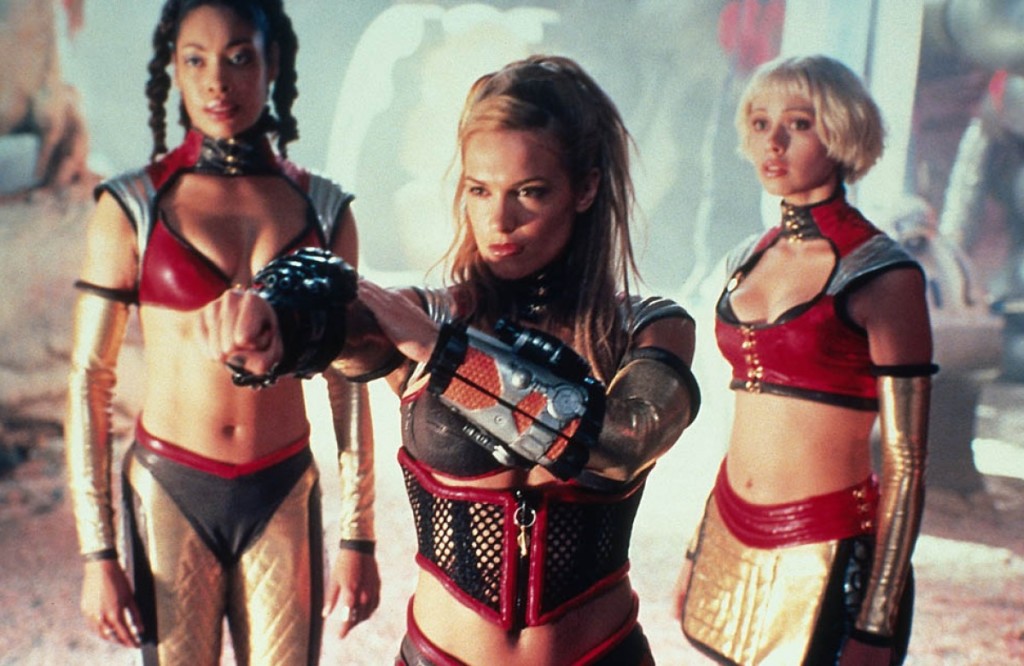 ★★★
★★★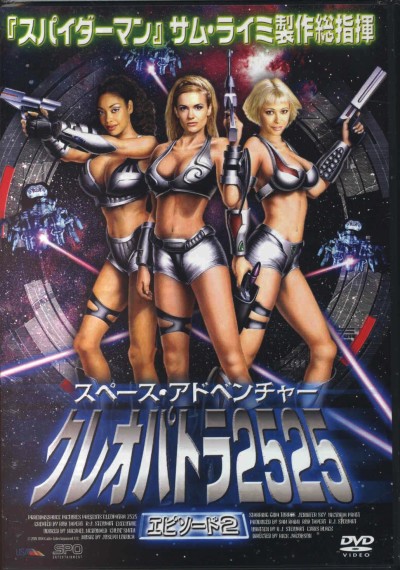 All three, however, were clearly selected as much for their visual appeal, and the 25th century is not short of beautiful people – it’s also quite warm, going by the ah, flimsy clothing worn by the trio. Cleo and her former profession fit right in. But taking any of this seriously would largely be doing the show a disservice, because it’s clear it doesn’t take itself seriously. There isn’t really time for that kind of thing, with each episode barely 20 minutes, excluding opening (theme song sung by Torres, a funked-up and lyrically altered version of Zager and Evans’ one-hit wonder, In the Year 2525) and closing credits. There isn’t much time for anything, in fact: both characterization and plotting remain about as scanty as the outfits. Hel is thoughtful but can be distant; Sarge likes shooting things first and asking questions later; Cleo, to be honest, is mostly irritating, coming over as both whiny and rather vacuous.
All three, however, were clearly selected as much for their visual appeal, and the 25th century is not short of beautiful people – it’s also quite warm, going by the ah, flimsy clothing worn by the trio. Cleo and her former profession fit right in. But taking any of this seriously would largely be doing the show a disservice, because it’s clear it doesn’t take itself seriously. There isn’t really time for that kind of thing, with each episode barely 20 minutes, excluding opening (theme song sung by Torres, a funked-up and lyrically altered version of Zager and Evans’ one-hit wonder, In the Year 2525) and closing credits. There isn’t much time for anything, in fact: both characterization and plotting remain about as scanty as the outfits. Hel is thoughtful but can be distant; Sarge likes shooting things first and asking questions later; Cleo, to be honest, is mostly irritating, coming over as both whiny and rather vacuous.








 I’m on the fence with regard to the Japanese uber-gore films, most notably, by the Sushi Typhoon studio, which have achieved renown (or infamy) of late. While some (
I’m on the fence with regard to the Japanese uber-gore films, most notably, by the Sushi Typhoon studio, which have achieved renown (or infamy) of late. While some ( This is definitely a case where less would have been more, and with a more enthusiastic hand on the editor’s knife, this could have become a decent eighty-minute feature – and possibly an even better 50-minute one. Kamikura does often demonstrate an awareness and acceptance of exactly how ludicrous the entire scenario is, and the film is at its best when wholeheartedly embracing its own insanity. For instance, each of the cyborg athletes’ talents is influenced by their sport: Hitomi Oka is a tennis-player, so whacks people with an over-sized, pneumatic racket, and lobs exploding tennis-balls at them. Additional helpings of that kind of imaginative lunacy – and considerably less tied-up schoolgirls being prodded or whipped – would certainly have made for a more entertaining end product.
This is definitely a case where less would have been more, and with a more enthusiastic hand on the editor’s knife, this could have become a decent eighty-minute feature – and possibly an even better 50-minute one. Kamikura does often demonstrate an awareness and acceptance of exactly how ludicrous the entire scenario is, and the film is at its best when wholeheartedly embracing its own insanity. For instance, each of the cyborg athletes’ talents is influenced by their sport: Hitomi Oka is a tennis-player, so whacks people with an over-sized, pneumatic racket, and lobs exploding tennis-balls at them. Additional helpings of that kind of imaginative lunacy – and considerably less tied-up schoolgirls being prodded or whipped – would certainly have made for a more entertaining end product. And not a very good movie at that, suffering from such multiple personality disorder, it sometimes feels that two completely different anime were spliced together in some mad scientist’s laboratory. If so, he clearly got bored and drifted off while the project was half complete, because this ends in a way which doesn’t so much suggest another part, as demand it unconditionally. Six years on, that still hasn’t materialized, making this about as appetizing as a half-cooked chicken. Oh, and speaking of mad scientists, there’s one of those in here too.
And not a very good movie at that, suffering from such multiple personality disorder, it sometimes feels that two completely different anime were spliced together in some mad scientist’s laboratory. If so, he clearly got bored and drifted off while the project was half complete, because this ends in a way which doesn’t so much suggest another part, as demand it unconditionally. Six years on, that still hasn’t materialized, making this about as appetizing as a half-cooked chicken. Oh, and speaking of mad scientists, there’s one of those in here too.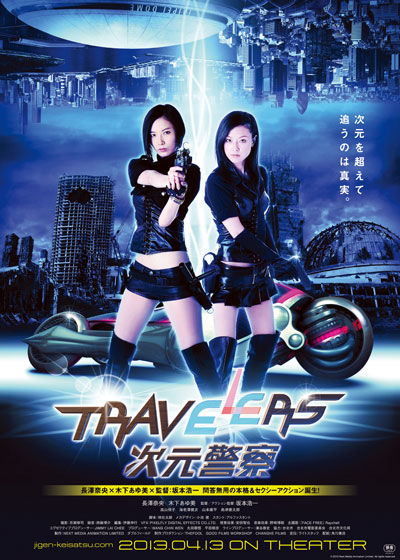 This doesn’t so much hit the ground running, as plummet into it at top speed, to such an extent I genuinely stopped the film, to check if this was perhaps part two of an ongoing series. It isn’t: it’s just that unconcerned about explanations. What seems to be going on, is a universe where the different dimensions are now connected. Hence, there’s Retro World, Fairy World, Lost World, etc. This offers new criminal possibilities; to counter these, a trans-dimensional police force is also created. One such officer is Ai (Nagasawa), but her mission, to protect a psychic (Takayama) against the terrorist group Doubt is thrown into… Well, doubt after she meets her former partner Yui (Kinoshita), who appears to have thrown her lot in on the side of the villains.
This doesn’t so much hit the ground running, as plummet into it at top speed, to such an extent I genuinely stopped the film, to check if this was perhaps part two of an ongoing series. It isn’t: it’s just that unconcerned about explanations. What seems to be going on, is a universe where the different dimensions are now connected. Hence, there’s Retro World, Fairy World, Lost World, etc. This offers new criminal possibilities; to counter these, a trans-dimensional police force is also created. One such officer is Ai (Nagasawa), but her mission, to protect a psychic (Takayama) against the terrorist group Doubt is thrown into… Well, doubt after she meets her former partner Yui (Kinoshita), who appears to have thrown her lot in on the side of the villains.

 2013 was perhaps a landmark for women in action films. with the top slot at the American box-office going to Jennifer Lawrence in Catching Fire. But also present in the top five was this, which kicked Katniss’s arse for critical acclaim, snaring 10 Oscar nominations to Fire’s… Well, none at all, actually. That’s probably a little starker contrast than is accurate – they are respectively 97% and 90% Fresh at Rotten Tomatoes – but it is interesting to compare the two films and their approach. In Gravity, the sex of the lead character simply isn’t very relevant: you could switch it to being a man, and you wouldn’t need to change much, not even the name – Ryan Stone. I’d be unsurprised if told that, like Salt, this was originally written for a male lead. Indeed, it also fails the infamous Bechdel Test of feminism, passing none of its three criteria – though this says more about Bechdel’s uselessness than Gravity, I feel (Run Lola Run also goes 0-for-3, and it’s not the last thing it has in common, as we’ll see).
2013 was perhaps a landmark for women in action films. with the top slot at the American box-office going to Jennifer Lawrence in Catching Fire. But also present in the top five was this, which kicked Katniss’s arse for critical acclaim, snaring 10 Oscar nominations to Fire’s… Well, none at all, actually. That’s probably a little starker contrast than is accurate – they are respectively 97% and 90% Fresh at Rotten Tomatoes – but it is interesting to compare the two films and their approach. In Gravity, the sex of the lead character simply isn’t very relevant: you could switch it to being a man, and you wouldn’t need to change much, not even the name – Ryan Stone. I’d be unsurprised if told that, like Salt, this was originally written for a male lead. Indeed, it also fails the infamous Bechdel Test of feminism, passing none of its three criteria – though this says more about Bechdel’s uselessness than Gravity, I feel (Run Lola Run also goes 0-for-3, and it’s not the last thing it has in common, as we’ll see).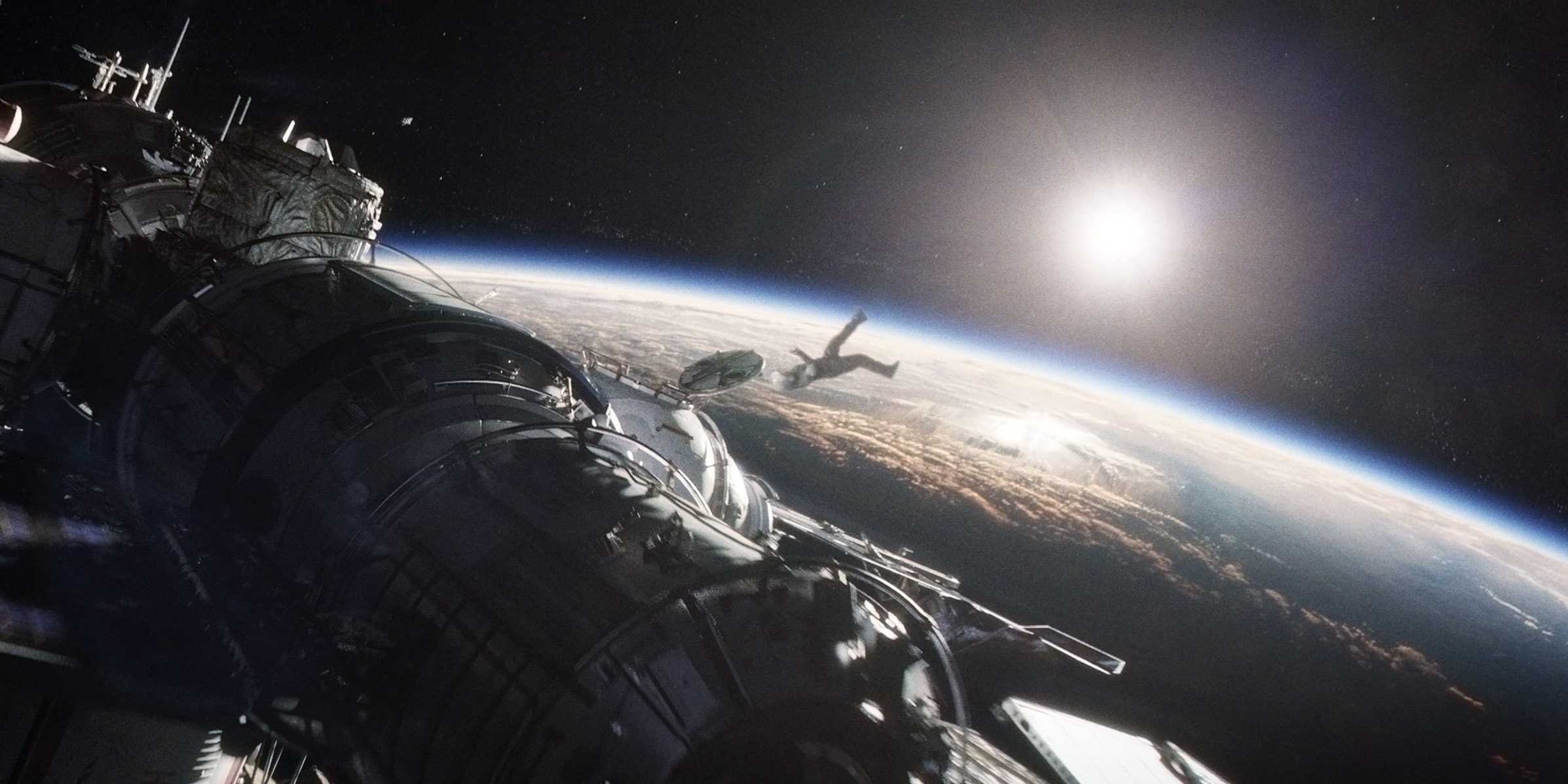
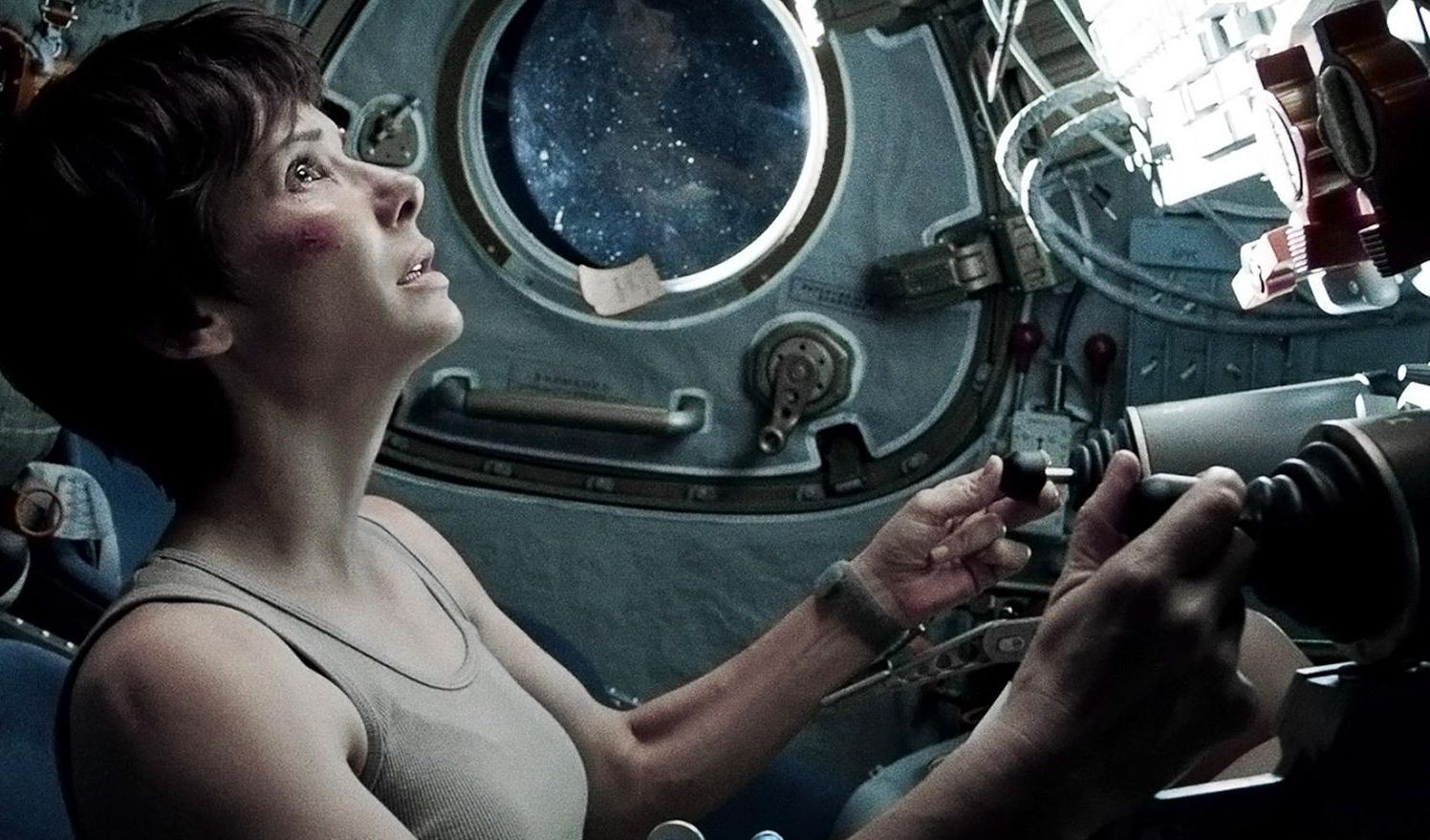
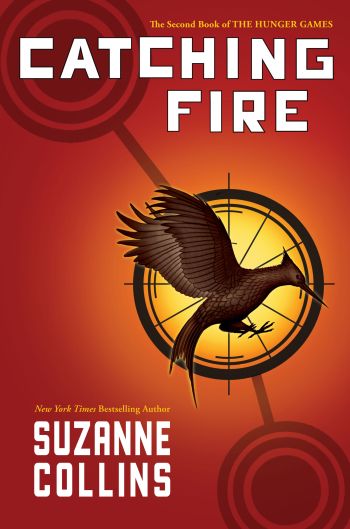
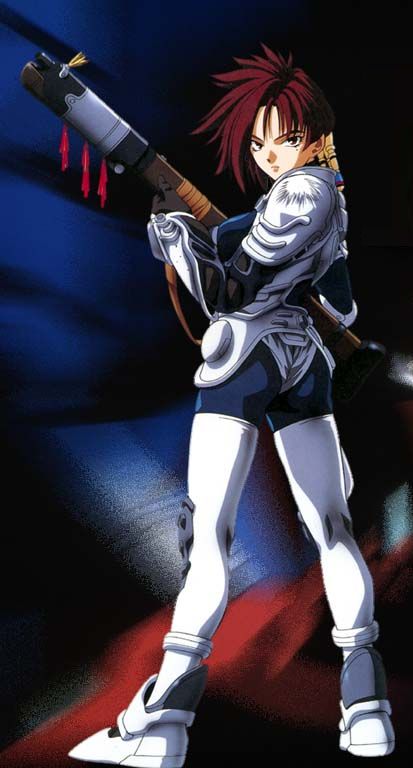 Though released several years later, this is a prequel to the two Zeiram movies, telling the story of the first encounter between Iria (Hisakawa, who was also Sailor Mercury) and Zeiram. At the time, she was an apprentice bounty-hunter, working alongside her brother Gren. They take a mission to rescue a VIP and recover the cargo from a stranded space-ship. However, once there, they discover the “cargo” is actually the alien Zeiram, which a corporation is interested in using as a weapon. The result leaves her brother apparently dead, and Iria now the target for the corporation, who want to hush up their thoroughly-dubious plan, by any means necessary. Fortunately, as well as her own skills, our heroine has the assistance of former rival bounty-hunter, Fujikuro (Chiva), endearing urchin Kei (Kanai), and Bob (Ikeda), a colleague whose consciousness has been turned into an AI.
Though released several years later, this is a prequel to the two Zeiram movies, telling the story of the first encounter between Iria (Hisakawa, who was also Sailor Mercury) and Zeiram. At the time, she was an apprentice bounty-hunter, working alongside her brother Gren. They take a mission to rescue a VIP and recover the cargo from a stranded space-ship. However, once there, they discover the “cargo” is actually the alien Zeiram, which a corporation is interested in using as a weapon. The result leaves her brother apparently dead, and Iria now the target for the corporation, who want to hush up their thoroughly-dubious plan, by any means necessary. Fortunately, as well as her own skills, our heroine has the assistance of former rival bounty-hunter, Fujikuro (Chiva), endearing urchin Kei (Kanai), and Bob (Ikeda), a colleague whose consciousness has been turned into an AI.